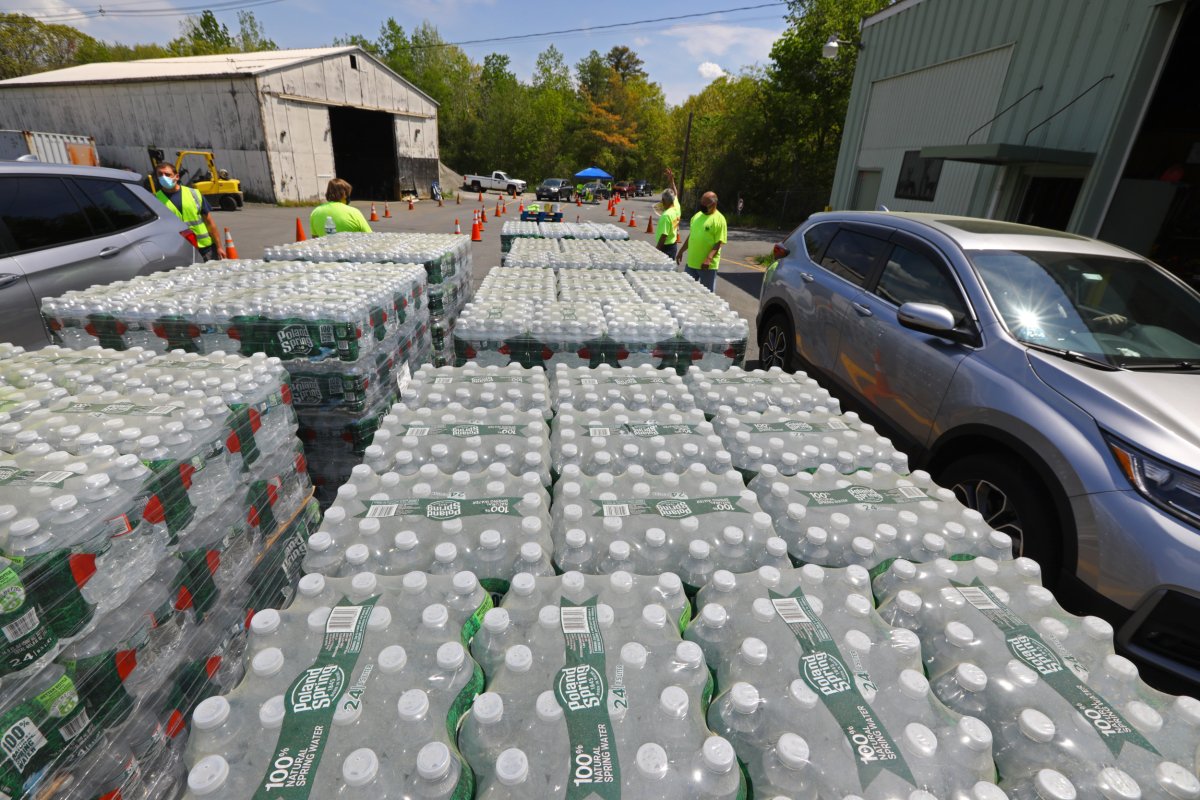The lawyer who helped contaminated communities win the first lawsuits over pollution from “forever chemicals” said the U.S. Environmental Protection Agency’s new rule on PFAS chemicals in water is a historic, if long overdue, step forward for public health protection.
“It’s a day I thought I would never see,” Rob Bilott said in a press briefing following the EPA’s announcement Wednesday of new drinking water standards for several PFAS chemical compounds. “It took us a long time to get here, way too many decades passed. But now we can start moving forward.”
Bilott, a partner in the Cincinnati law firm Taft Stettinius & Hollister LLP, said he first alerted regulators about the potential risks from PFAS chemicals 21 years ago. As he investigated concerns from residents near a chemical facility that manufactured PFAS chemicals, he discovered evidence that exposure could be linked to a range of health problems.
EPA Administrator Michael Regan set tough new drinking water standards on Wednesday that will require water systems to test for several PFAS chemicals and control them to levels of just a few parts per trillion. The EPA standards are the first nationwide, legally enforceable limits on PFAS chemicals, and public health advocates said they are among the strongest such standards worldwide.

Rob Bilott (left) and actor Mark Ruffalo on Capitol Hill in Washington, D.C., in 2019. Ruffalo portrayed Bilott in the film “Dark Waters,” based on Bilott’s legal action against PFAS polluters.
Marvin Joseph/The Washington Post via Getty Images
“The scientific facts and truth about the dangers posed by these toxins have finally prevailed over the decades of corporate cover-ups,” Bilott said.
Thousands of related fluorinated alkyl chemicals, collectively known as PFAS (perfluoroalkyl and polyfluoroalkyl substances), have been used for decades in nonstick pans, waterproof and stain-resistant clothing, firefighting foam and a host of other products.
Once in the environment, however, PFAS chemicals are very slow to break down and can accumulate and persist in the human body. Health studies link exposure to several forms of cancer, birth defects, developmental problems in children and a range of other health threats, and it’s estimated that about half of all U.S. tap water is tainted with some level of PFAS.
Bilott’s work helped to bring that information to light. Now, he says important work remains to limit further PFAS pollution and to pay for water testing and treatment.
“It’s important to make sure the cost of implementing this doesn’t get passed on to the victims of this contamination,” he said.
Community Action Paved the Way
Bilott’s work on PFAS started with residents in the Ohio River Valley who had questions about possible contamination from a DuPont facility near Parkersburg, West Virginia. The lawsuit and investigation revealed that DuPont knew about potential health impacts of exposure to PFAS chemicals but kept that information hidden.
An early legal settlement established a widespread system to collect biological samples and medical histories from thousands of residents who might have been exposed to PFAS chemicals through drinking water.
“That was the community that offered up blood samples and medical information and volunteered time for medical studies,” Bilott said. An independent medical panel then assessed the data gathered to identify potential links between exposure and certain illnesses, laying the groundwork for both further litigation and more medical research.
“It was those folks who really led the way in establishing the science,” Bilott said.
Bilott’s firm won $750 million in compensation for the area’s residents, and an ongoing program put in place in 2013 allows free medical screening for people in the area to assist early diagnosis of health issues that might be linked to PFAS exposure.
Subsequent legal action against DuPont and other PFAS makers, including 3M, has resulted in billions of dollars in judgments and settlements to address damages and help pay for water cleanup.
Industry representatives criticized the EPA’s new standards, raising concerns about the costs of water treatment that will be required and casting doubt on the science linking PFAS exposure to health problems.
The American Chemistry Council, the leading trade group for chemical companies, issued a statement expressing “serious concerns with the underlying science” the EPA used to develop the standards.
The American Water Works Association, which represents many water systems, said its analysis of the EPA standards estimates that it will cost almost $4 billion annually, several times higher than what the EPA estimated.

Because of the elevated levels of PFAS found in its public water sources, Wayland, Massachusetts, officials distributed bottled water to the public in 2021. As many as 5,000 water systems around the country will likely…
Pat Greenhouse/The Boston Globe via Getty Images
‘Proven Solutions’ for the PFAS Challenge
EPA Administrator Regan returned to his home state to announce the new water standards at an event in Fayetteville, North Carolina.
“This battle started for me right here in Fayetteville,” Regan said. As director of the state’s Department of Environmental Quality, Regan had worked with residents of Fayetteville and other communities that drew drinking water from the Cape Fear River, which had been severely impacted by PFAS contamination.
Regan used the event to rebut criticism about the money that will be required to meet the new standard.
“Folks, you’re going to hear people talk about cost, and it can’t be done, and we shouldn’t do this,” Regan said. “Let me just tell you it can be done, it can be achieved using a range of technologies and approaches that many water systems are using today.”
Fayetteville’s water system has opted for a granular-activated carbon treatment system to remove PFAS contamination with a projected cost of $80 million. The city is getting help from state and federal funding, including money from the federal Bipartisan Infrastructure Law. The EPA announced Wednesday an additional $1 billion in newly available funding from the law for water system improvements and testing for private well water.
The water technology company Xylem, which has provided PFAS remediation equipment to more than 80 water systems, said in a statement that PFAS is a serious challenge and as many as 5,000 utilities may have to take action to reduce contamination.
“Fortunately, there are practical ways for communities to remove PFAS from drinking water,” Xylem Senior Vice President and Chief Growth and Innovation Officer Snehal Desai said. “Proven solutions exist.”
Other companies, including Milwaukee-based Zurn Elkay, are offering filtration systems to remove PFAS from water at points of consumption, such as water coolers and fountains in schools and workplaces.
Both companies appear on Newsweek’s 2024 list of America’s Most Responsible Companies. Xylem ranks second overall and Zurn Elkay ranks 78th among the 600 listed companies.
Public health and environmental advocates stressed the costs from chemical exposure and the estimated health benefits of reducing PFAS in water.
“The EPA has prepared a very comprehensive economic analysis that looks at the incredible disease burden of not taking action on these chemicals,” Melanie Benesh, vice president for government affairs at the Environmental Working Group, told Newsweek. The EPA estimates $1.5 billion in benefits from the new standards.
“That benefit is really translated in thousands of lives saved and tens of thousands of serious illnesses prevented,” Benesh said.
Attorney Bilott said settlements with companies responsible for contamination can be directed toward some of the costs of water treatment, and he is hopeful that the new standards will also help to advance other regulations to limit the release of more PFAS chemicals.
“What you see now worldwide is efforts to try to stop this stuff at the source, to keep more of it from coming out into the world,” he said.
Bilott wrote about his experience holding PFAS chemical makers accountable in a book, Exposure: Poisoned Water, Corporate Greed, and One Lawyer’s Twenty-Year Battle Against DuPont, which was the basis of a 2019 film, Dark Waters, starring Mark Ruffalo as Bilott.
Ruffalo, who is well-known for his support of environmental causes, issued his own statement on the EPA’s standards. He thanked Bilott for his work and offered a message to the communities affected by contamination: “Your voices have been heard.”
Uncommon Knowledge
Newsweek is committed to challenging conventional wisdom and finding connections in the search for common ground.
Newsweek is committed to challenging conventional wisdom and finding connections in the search for common ground.
>>> Read full article>>>
Copyright for syndicated content belongs to the linked Source : Newsweek – https://www.newsweek.com/crusading-environmental-lawyer-praises-epa-limits-forever-chemicals-1889157










